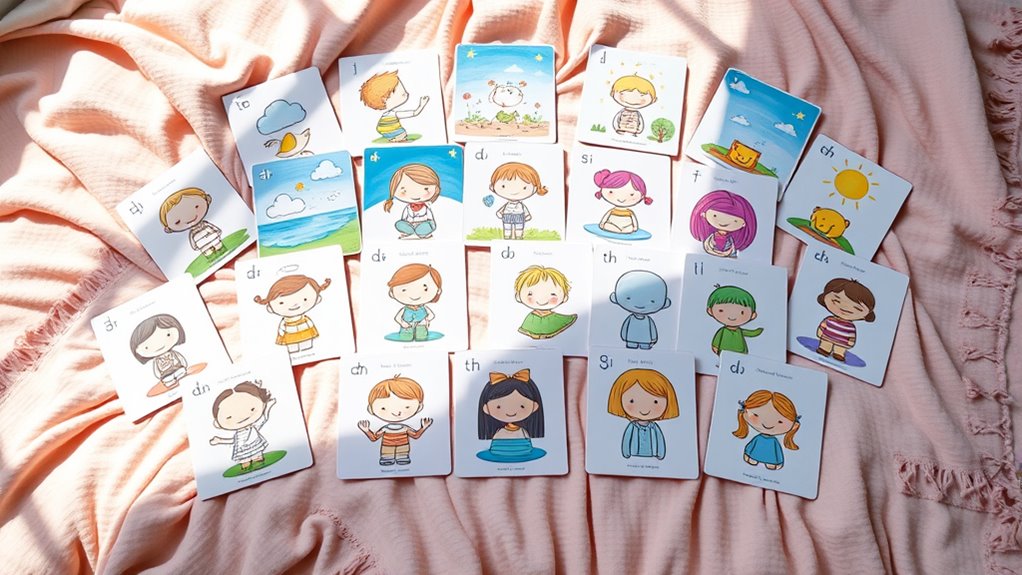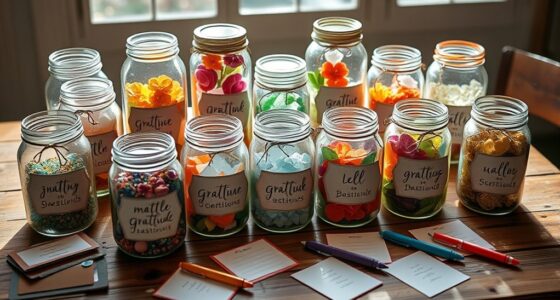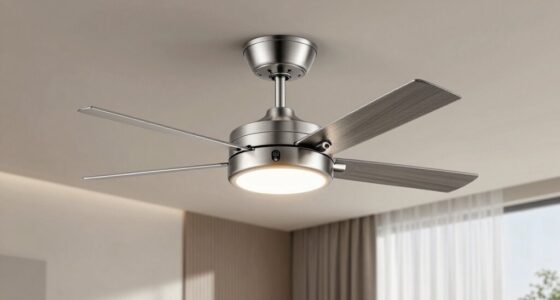I’ve found that the best kids mindfulness cards are vibrant, durable, and fun, making it easy for children to stay calm and focus. They include activities like guided imagery, breathing exercises, affirmation games, and engaging visuals that keep kids interested. Whether for home, school, or therapy, these sets promote emotional regulation and resilience. Keep exploring, and you’ll discover options that suit different ages, interests, and settings—so your child can enjoy mindfulness in a way that feels exciting and rewarding.
Key Takeaways
- Look for bright, engaging illustrations and fun activities that capture children’s interest and promote active participation.
- Choose sets with diverse content like guided imagery, breathing exercises, and storytelling to keep routines fresh and enjoyable.
- Prioritize durable, high-quality cards designed for frequent handling, ensuring longevity during active use.
- Opt for age-appropriate options tailored to different developmental stages, from preschool to teen-focused activities.
- Consider additional features like online resources, guided scripts, or game elements that make mindfulness practice interactive and fun.
Imagine Meditation Kit for Kids

If you’re looking for a versatile and engaging mindfulness tool for children aged 4 and up, the Imagine Meditation Kit for Kids is an excellent choice. I love how it includes 24 vibrant, illustrated scripts and affirmation cards that guide kids through imagery meditations, breathing exercises, and calming activities. The sturdy design guarantees durability, making it perfect for repeated use at home, school, or therapy. It promotes focus, relaxation, and emotional awareness while being fun and easy to navigate. Whether used individually or in groups, this kit helps children build mindfulness skills in a playful, accessible way that truly supports their emotional well-being.
Best For: children aged 4 and up, parents, teachers, and therapists seeking an engaging, durable mindfulness tool to foster emotional awareness, relaxation, and focus.
Pros:
- Vibrant, beautifully illustrated scripts and affirmation cards that captivate children’s attention
- Versatile for individual, group, home, school, or therapy use, supporting various social-emotional learning activities
- Durable design with easy navigation aids, making it suitable for repeated use and long-term benefit
Cons:
- The size of the cards may be too large for very young children to handle comfortably
- Some users might find the content more effective with adult guidance or supervision
- Limited to age 4 and above, so it may not be suitable for younger children or infants
FUN Mindful Match Card Game for Families and Adults
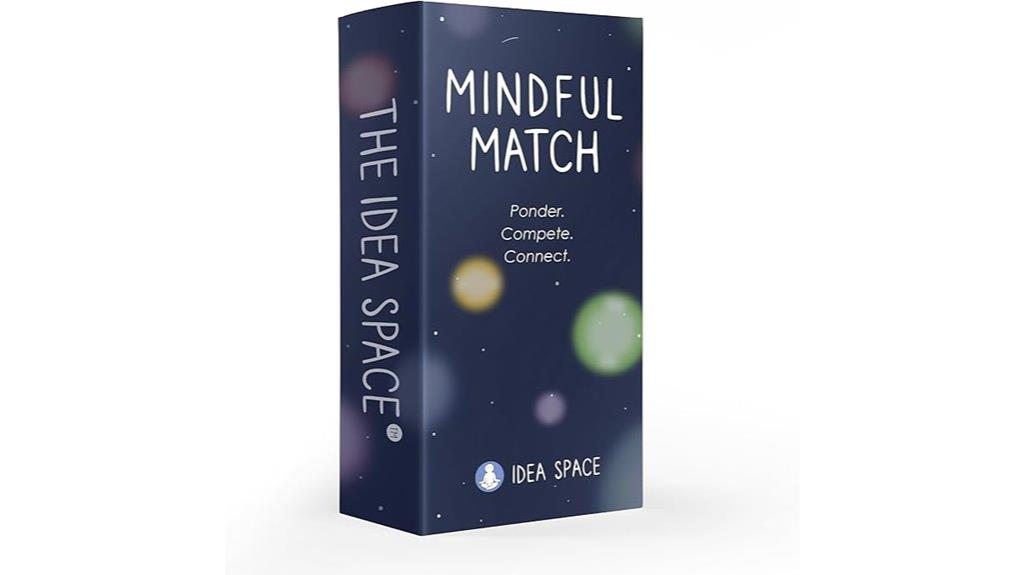
The FUN Mindful Match Card Game is an excellent choice for families and adults seeking meaningful, engaging conversations that foster mindfulness and connection. With 500 cards—Response, Prompt, and Action—it encourages deep discussions, self-awareness, and reflection. The game’s mechanics promote strategic thinking and provide variety, making each session unique. It’s perfect for stress relief, strengthening bonds, and enhancing mental well-being. Whether at a family night, outdoor gathering, or long-distance call, it offers versatile ways to relax and connect. This game truly makes mindfulness fun, turning meaningful conversations into an enjoyable, memorable experience for all ages.
Best For: families, adults, teens, and children seeking meaningful conversations, mindfulness, and stress relief through engaging, strategic gameplay.
Pros:
- Promotes deep discussions, self-awareness, and emotional connection
- Versatile for various settings like family nights, travel, or outdoor activities
- Supports mental well-being and relaxation, making it a top anxiety relief tool
Cons:
- May require adult guidance for younger children to fully engage with some prompts
- Some players might find the game’s depth less suitable for casual or quick play sessions
- The large number of cards may be overwhelming for those who prefer simpler, quicker games
Imagine Meditation Cards for Kids
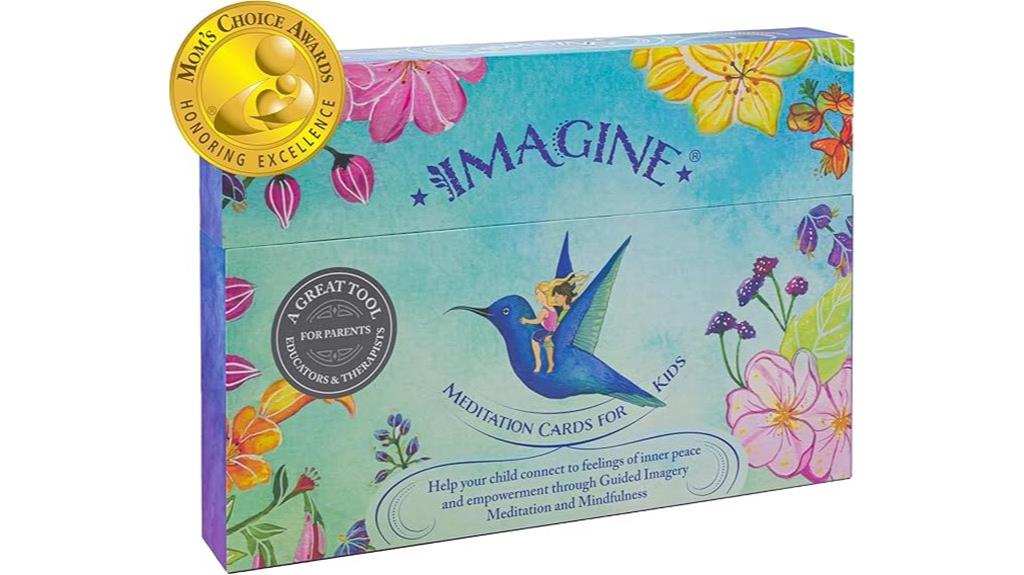
Imagine Meditation Cards for Kids stand out as an excellent choice for parents, teachers, and therapists seeking engaging tools to cultivate mindfulness and emotional well-being in children aged 4-17. This award-winning kit features 24 vibrant, content-rich guided imagery scripts, calming meditations, breathing exercises, and DIY cards for personalization. The large, beautifully illustrated XL cards inspire wonder, imagination, and inner peace. Designed for individual, group, or family use, they promote relaxation, focus, and emotional regulation. Compact and portable, the set seamlessly fits into daily routines, making mindfulness accessible and fun for children, while fostering calmness, connection, and positive growth.
Best For: parents, teachers, and therapists looking for engaging, versatile tools to promote mindfulness, emotional regulation, and calmness in children aged 4-17.
Pros:
- Versatile for individual, group, or family use, making it suitable for various settings.
- High-quality, visually appealing artwork and messages that inspire wonder and relaxation.
- Supports emotional development, stress reduction, and positive routines for children.
Cons:
- Personalization of wording may be necessary to maximize effectiveness for individual children.
- Some users may need to incorporate additional activities for comprehensive emotional support.
- The set’s physical size may require storage space in smaller environments.
QUOKKA 65 Positive Affirmations Cards for Kids
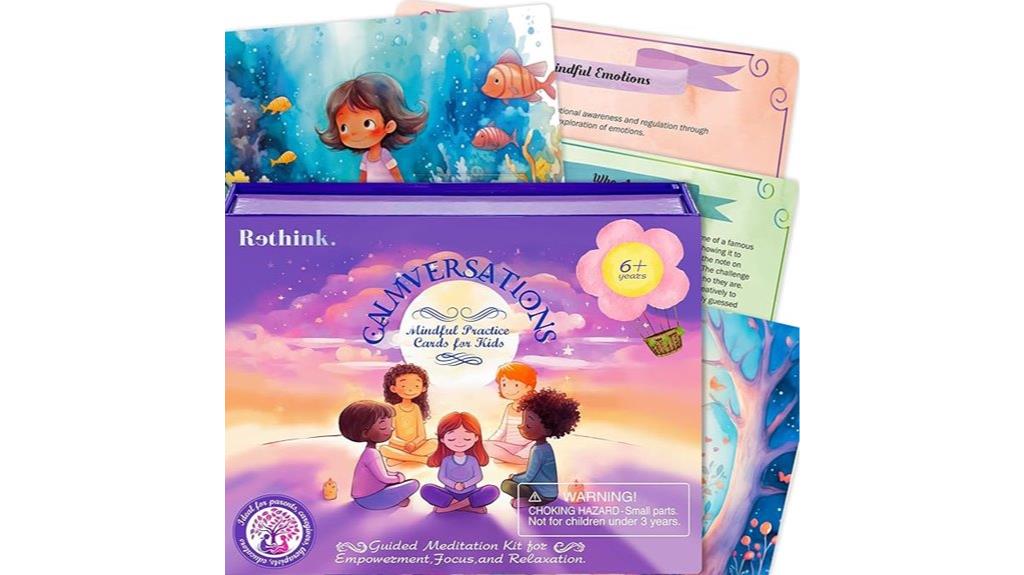
Designed with children aged 6 to 12 in mind, QUOKKA 65 Positive Affirmations Cards are an engaging tool for fostering emotional well-being and self-confidence. These vibrant, extra-large cards feature child-friendly visuals and are made from sturdy cardstock, perfect for active kids. The set includes three color-coded categories: mindful practice, visualization, and icebreakers, each offering simple exercises and affirmations. Kids can use them independently or in groups to promote calmness, focus, gratitude, and self-acceptance. With clear instructions and appealing designs, these cards easily encourage daily mindfulness, helping children build resilience, improve self-esteem, and develop emotional literacy in a fun, accessible way.
Best For: parents, educators, and therapists seeking an engaging, child-friendly tool to promote emotional well-being, self-confidence, and mindfulness in children aged 6-12.
Pros:
- Vibrant, colorful, and visually appealing design that captures children’s attention.
- Durable, extra-large cards suitable for active handling and group activities.
- Easy-to-follow instructions and thematic organization make them accessible for independent or guided use.
Cons:
- Primarily designed for children, so some adults may find limited use without adaptation.
- The set may benefit from digital enhancements, such as audio guidance, which are not included.
- Limited age range; older children or teenagers might require more advanced materials.
Mindful Kids: 50 Mindfulness Activities for Kindness , Focus and Calm
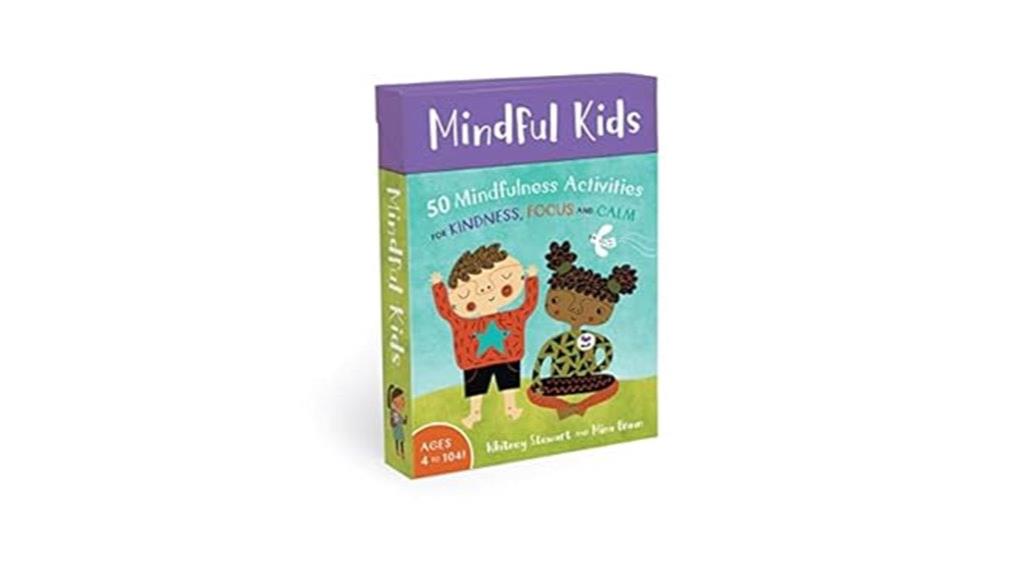
If you’re looking for an engaging way to help children develop kindness, focus, and calm, “Mindful Kids: 50 Mindfulness Activities for Kindness, Focus, and Calm” is a perfect choice. This set features beautifully illustrated, durable cards with simple instructions, making them easy to use at home, school, or in therapy. The activities are versatile, suitable for individual or group use, and promote emotional regulation, relaxation, and social skills. Many parents and professionals find these cards effective in reducing stress and fostering mindfulness, especially for sensitive children. They turn calm and focus practices into fun, interactive routines that kids genuinely enjoy.
Best For: Parents, educators, and therapists seeking engaging, age-appropriate tools to teach children mindfulness, kindness, and emotional regulation.
Pros:
- Well-made, beautifully illustrated cards that are durable and visually appealing.
- Simple, clear instructions suitable for children of various ages and settings.
- Versatile for individual or group use, promoting social interaction and emotional growth.
Cons:
- May require adult guidance for younger children to fully understand activities.
- Some children might need multiple sessions to become fully engaged or comfortable.
- The set may be less effective if not regularly incorporated into routines or if children prefer more active activities.
Mind Brain Emotion 52 Coping Skills for Kids: Therapy Game
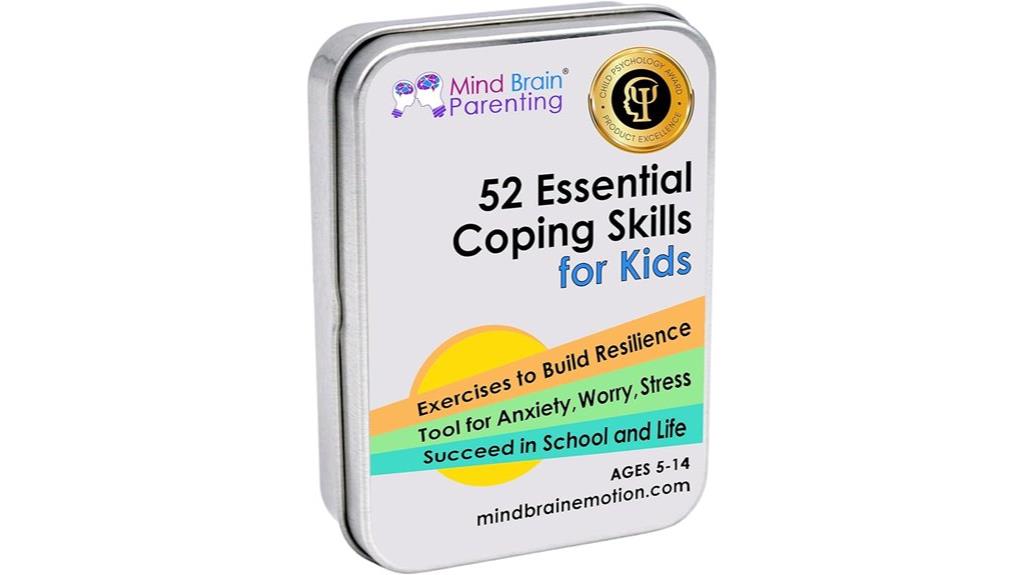
The “Mind Brain Emotion 52 Coping Skills for Kids” therapy game is an excellent choice for children aged 5 to 15 who need practical tools to manage stress, anxiety, and emotional challenges. This award-winning CBT card game offers over 50 engaging exercises, conversation starters, and coping strategies designed to build resilience, self-regulation, and emotional awareness. The durable, visually appealing cards are easy to understand and versatile, making them perfect for therapy, classroom activities, or family use. With additional videos and online assessments, it’s a *holistic* resource that encourages kids to express feelings, calm down, and develop a growth mindset.
Best For: children aged 5-15, parents, teachers, and mental health professionals seeking practical tools to support emotional regulation, resilience, and stress management.
Pros:
- Engaging, visually appealing cards that facilitate easy understanding and meaningful conversations
- Versatile for use in therapy, classroom activities, and family settings
- Includes additional resources like videos and online assessments to enhance learning and application
Cons:
- Thinner cards may not withstand frequent handling; durability could be improved
- Not a substitute for professional mental health treatment, only a supportive tool
- Some users find the set limited in the number of activities for ongoing use without supplementing with additional resources
Breathe Like a Bear Mindfulness Cards for Kids
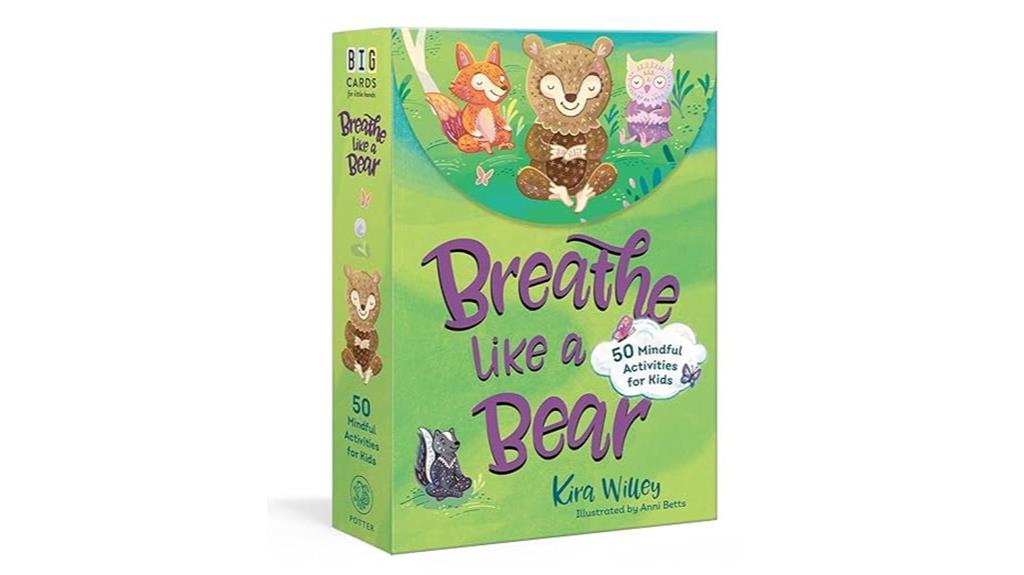
Breathe Like a Bear Mindfulness Cards stand out as an excellent choice for parents, teachers, and therapists seeking engaging tools to help children manage emotions and develop mindfulness skills. With 50 beautifully illustrated, calming activities, these cards are highly versatile for home, school, or therapy settings. They promote emotional regulation through fun techniques like breathing exercises and role-playing, especially benefiting children with sensory processing challenges. Many users find them durable and portable, making mindfulness accessible anytime. Kids often enjoy using the cards independently, helping them feel more in control during stressful moments. Overall, they’re a trusted resource for fostering calmness and emotional resilience in children.
Best For: parents, teachers, and therapists seeking engaging, age-appropriate tools to help children develop mindfulness, emotional regulation, and coping skills in various settings.
Pros:
- Beautiful artwork and high-quality design make the cards visually appealing and durable.
- Versatile for use at home, school, or in therapy sessions, supporting a range of emotional and mindfulness activities.
- Encourages independent use by children, fostering self-regulation and emotional resilience.
Cons:
- Some users reported minor issues with packaging damage upon delivery.
- The set may be limited in scope for children needing more personalized or intensive support.
- The size of the cards might be small for some children to handle comfortably during activities.
100 Mindfulness Conversation Starter Cards for Kids
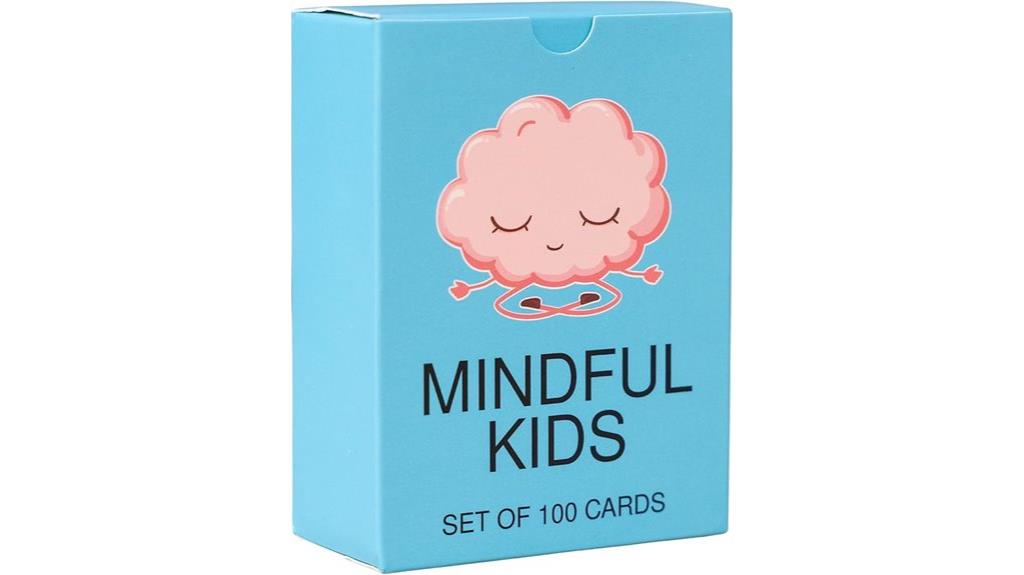
Designed specifically for children aged 8 and up, Mindfulness Conversation Starter Cards for Kids offer a fun and engaging way to promote emotional awareness and mindful communication. With 100 sturdy, portable cards, they include prompts on feelings, gratitude, imagination, and focus, organized into categories like Emotion and Mindfulness. These cards are perfect for family dinners, classroom activities, or therapy sessions, helping kids express themselves and deepen connections. Rated 4.8 stars, many parents and teachers find them effective for sparking meaningful conversations, easing children into routines, and encouraging self-awareness. They’re a practical, low-pressure tool to make mindful dialogue accessible and enjoyable.
Best For: parents, teachers, and child therapists seeking an engaging, mindful conversation tool to foster emotional awareness and connection with children aged 8 and up.
Pros:
- Promotes meaningful, low-pressure conversations about feelings, gratitude, and mindfulness.
- Portable and durable cards that are easy to carry and suitable for various settings.
- Rated 4.8 stars, praised for sparking connection and encouraging emotional expression.
Cons:
- Some prompts may be repetitive or contain spelling errors, affecting flow.
- Not made from premium materials; cards and box may arrive slightly damaged.
- Occasionally oddly worded questions can require additional clarification for kids.
Imagine Meditation Cards for Kids
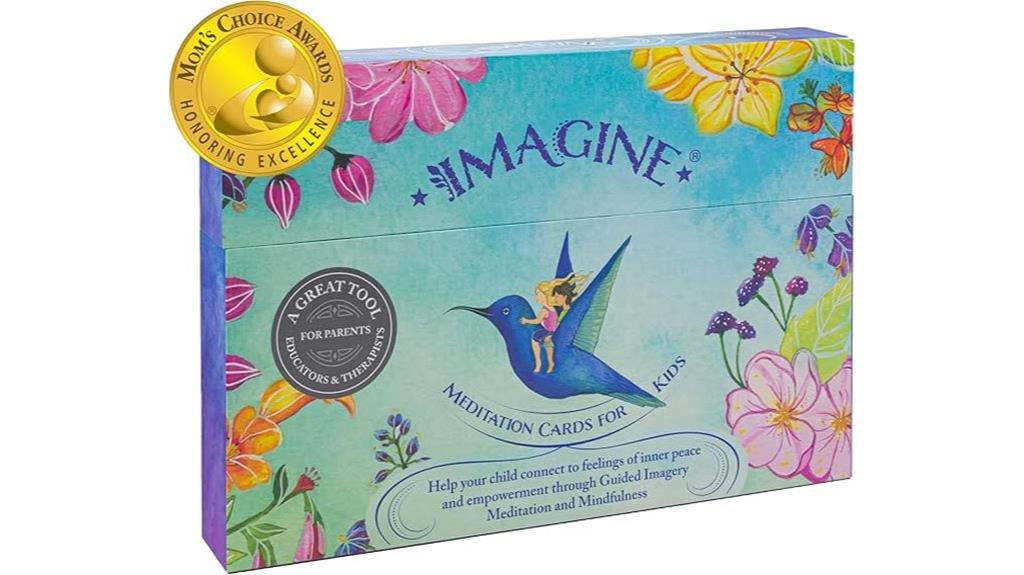
Imagine Meditation Cards for Kids stand out as an ideal choice for parents, teachers, and therapists seeking a versatile, engaging tool to introduce mindfulness to children aged 4-17. This award-winning kit includes 24 vibrant, content-rich guided imagery scripts, calming meditations, breathing exercises, and DIY cards for customization. The beautifully illustrated XL cards inspire wonder, imagination, and inner peace, making mindfulness fun and accessible. Perfect for individual, group, or family use, these cards help children develop focus, relaxation, and emotional resilience. Their portable design easily integrates into daily routines, making them a valuable resource for calming, bonding, and fostering emotional well-being.
Best For: parents, teachers, and therapists seeking an engaging, versatile mindfulness tool to support children aged 4-17 in developing focus, relaxation, and emotional resilience.
Pros:
- Vibrant, beautifully illustrated cards that inspire wonder and imagination
- Versatile for individual, group, or family use in various settings like home, school, and therapy
- High-quality, durable materials designed to foster calmness, emotional regulation, and positive visualization
Cons:
- Personalization of messages may be necessary for maximum empowerment and relevance
- Some users might require guidance on integrating the cards effectively into routines
- As a physical product, it may not be suitable for children with certain sensory sensitivities or preferences
Mindfulness Cards for Kids, Social Emotional Learning Tools
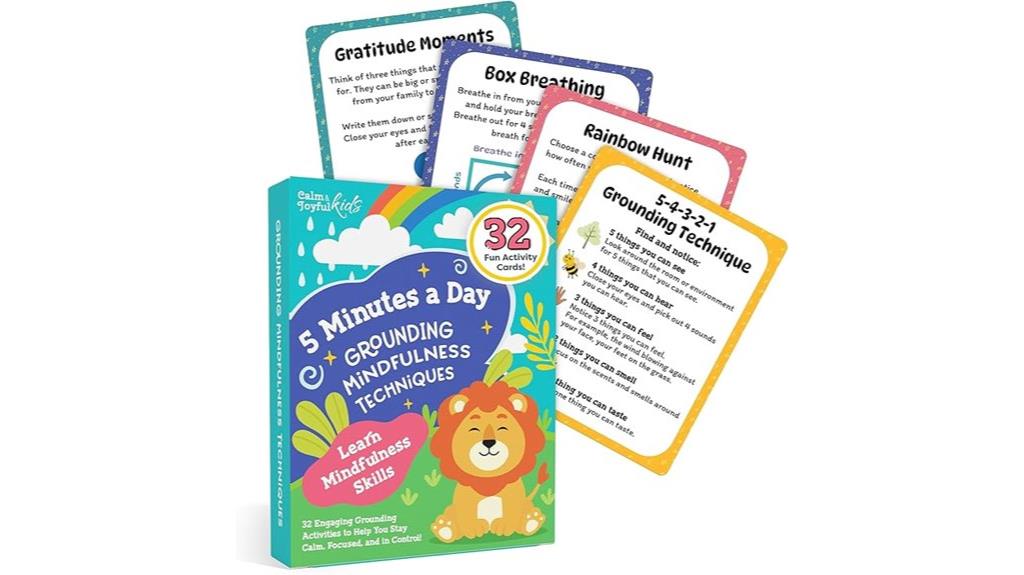
If you’re looking for a versatile tool to help children develop social-emotional skills, mindfulness cards are an excellent choice, especially for educators, therapists, and parents working with kids who need extra support. These cards include 32 colorful, engaging prompts that promote mindfulness, breathing, visualization, and movement. Suitable for children aged 3 and up, they help manage emotions, improve focus, and build self-regulation. Portable and sensory-friendly, they’re perfect for therapy, classrooms, or home use. Designed to foster emotional awareness and coping skills, these tools support daily routines like calming down, progressions, and brain breaks, making emotional growth accessible and fun.
Best For: educators, therapists, and parents working with children aged 3 and up who need support with social-emotional development, calming techniques, and self-regulation.
Pros:
- Colorful, engaging design that captures children’s attention and promotes participation
- Portable and sensory-friendly, suitable for various settings including travel and quick calming moments
- Versatile for use in therapy, classrooms, and home routines to support emotional awareness and mindfulness
Cons:
- Not laminated, which may affect durability with frequent use or handling
- Some activities might feel abstract or repetitive for certain children, especially those with attention challenges
- Visual design may seem plain compared to other more visually elaborate tools, potentially affecting engagement for some kids
Mindsight Breathing Buddha Guided Meditation Tool for Mindfulness
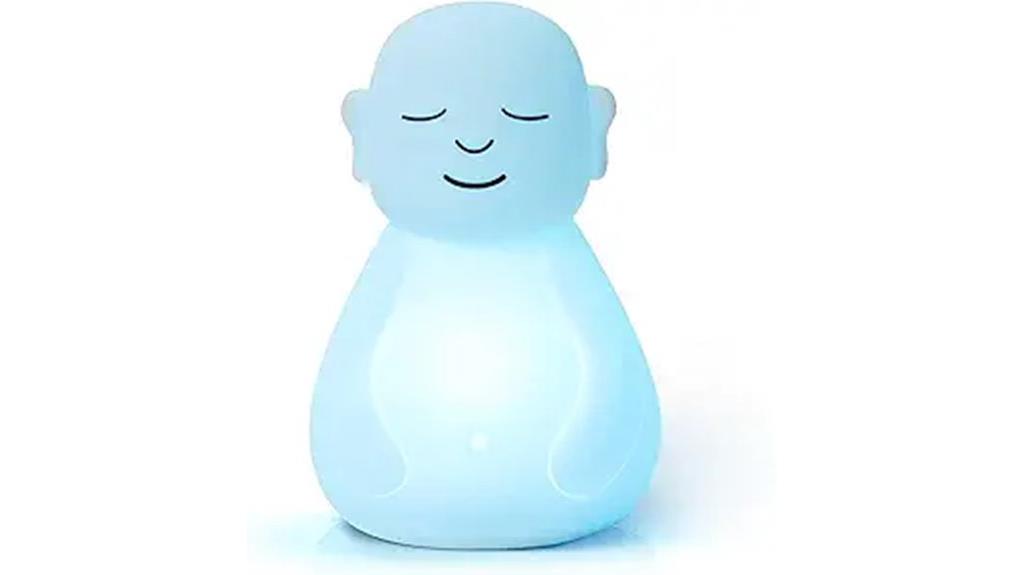
The Mindsight Breathing Buddha Guided Meditation Tool is perfect for anyone seeking a simple, effective way to cultivate mindfulness without distractions. Its gentle color cues guide your breathing, promoting calmness, focus, and better sleep. Designed for all ages and experience levels, it helps reduce stress, anxiety, and symptoms of depression. Compact and easy to use, it features adjustable brightness, a rechargeable battery, and a silent, visual approach that many find more effective than sound. Whether at home, work, or school, it’s a portable mini retreat that encourages living in the present moment and resetting your mind with calming, visual cues.
Best For: individuals of all ages seeking a simple, silent, and portable mindfulness tool to reduce stress, anxiety, and improve sleep through gentle visual breathing cues.
Pros:
- Easy to use with adjustable brightness and multiple calming breathing modes
- Silent, distraction-free visual cues enhance focus and relaxation
- Compact, portable design with long-lasting rechargeable battery ideal for home or travel
Cons:
- Lacks a built-in timer for structured meditation sessions
- Limited to color-based breathing prompts without additional guided features
- Some users may find the charging hole design difficult or the device limited compared to more advanced options
Mindfulness Matters Game to Improve Coping Skills
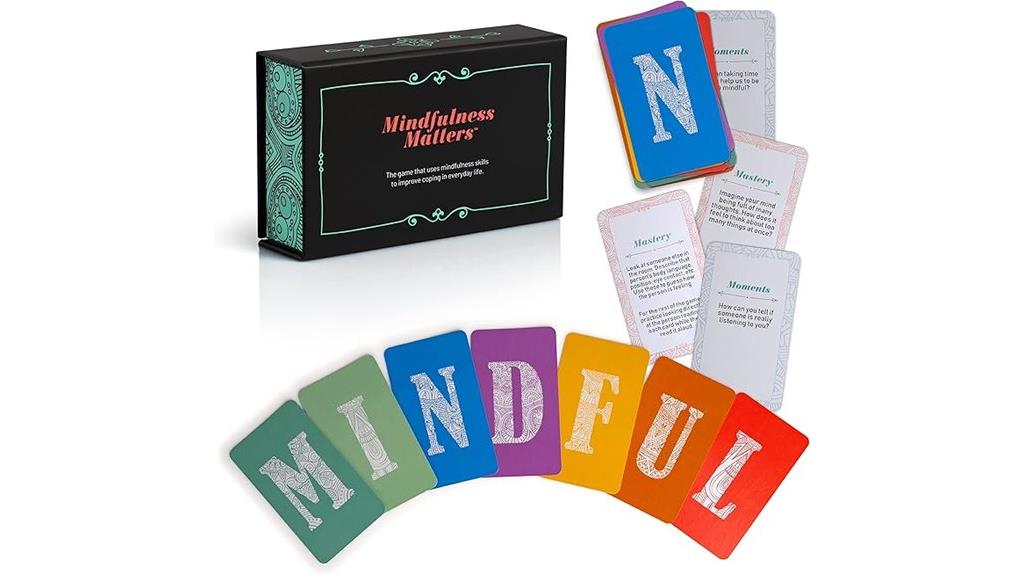
Mindfulness Matters Game is particularly effective for teens and older children, especially when used in therapy or educational settings focused on building coping skills. Developed by a licensed therapist, this original card game features 78 cards that teach practical mindfulness techniques, like breathing exercises and thought questions, to manage stress, anger, and worry. Its fun, cooperative gameplay helps players learn how to apply mindfulness in real life while working together to spell “MINDFUL.” Suitable for ages 9 and up, it’s a versatile tool in therapy, classrooms, or family settings that promotes social interaction and skill development, making mindfulness both accessible and engaging.
Best For: teens and older children in therapy, classroom, or family settings seeking a fun, practical way to develop mindfulness and coping skills.
Pros:
- Engages a wide age range with cooperative and competitive gameplay promoting social interaction.
- Teaches practical mindfulness techniques applicable to real-life stress, anger, and worry management.
- Versatile for individual, group, or family therapy and educational environments.
Cons:
- Some users find the spelling activity less stimulating and may seek creative modifications.
- The game may be less suitable for very young children or adults without adaptation.
- Limited engagement for players who prefer more dynamic or physical activities over card-based gameplay.
Empowering Cards for Kids: Mindfulness, Self-Esteem & Relaxation
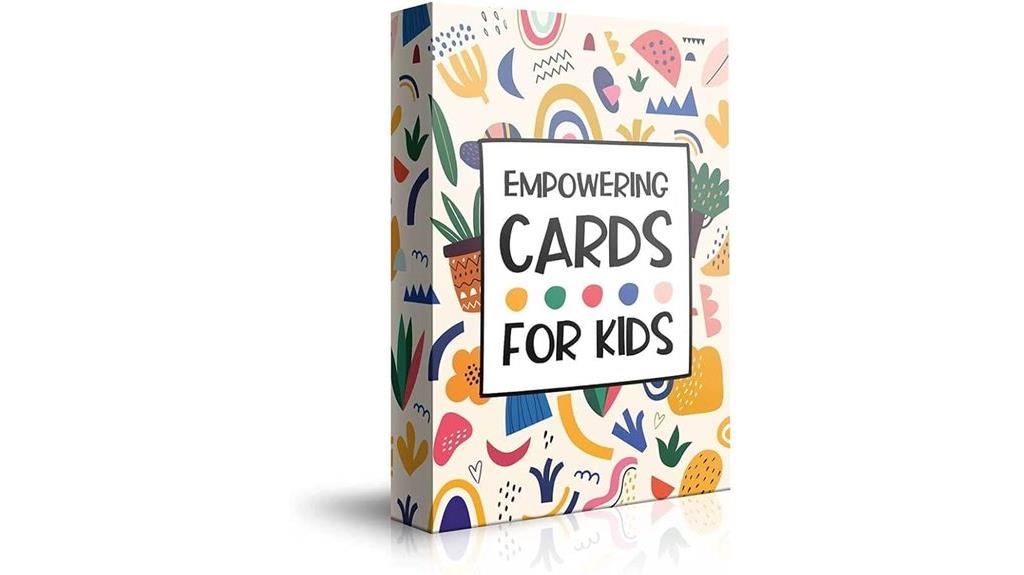
Empowering Cards for Kids are an excellent choice for parents, teachers, and therapists seeking engaging tools to foster emotional resilience and self-esteem in children. Developed by experts with over 25 years of experience, these cards teach mindfulness, meditation, positive affirmations, and relaxation techniques. The set features 50 beautifully designed cards divided into five categories: Self Esteem, Self Compassion, Relaxation, Encouragement, and Mindfulness. They promote emotional regulation, kindness, and calmness, making them versatile for individual or group use. Whether as a daily practice or a fun activity, these cards help children develop essential skills to navigate their emotions confidently and peacefully.
Best For: parents, teachers, therapists, and caregivers looking to support children’s emotional development, mindfulness, and self-esteem through engaging, educational tools.
Pros:
- Promotes emotional resilience, mindfulness, and relaxation skills in children.
- Versatile for individual or group activities, suitable for various settings.
- Beautifully designed cards that are engaging and easy to incorporate into daily routines.
Cons:
- May require adult guidance for younger children to maximize benefits.
- The set contains 50 cards, which might be overwhelming for some users to use all at once.
- Not a substitute for professional mental health support for children with significant emotional challenges.
Wooden Mindfulness Maze for Kids
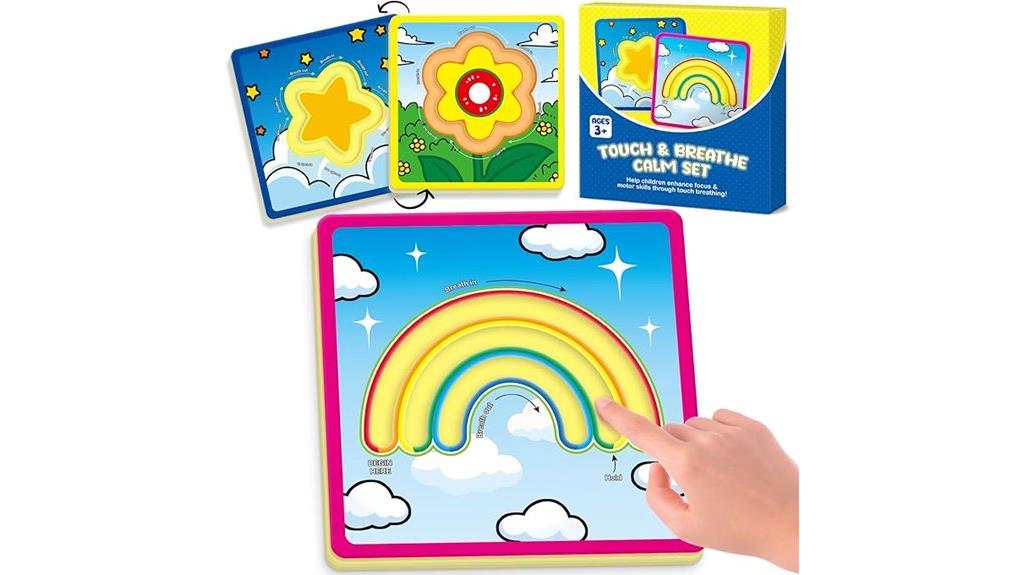
Looking for a tool that helps young children calm down and build emotional resilience? The Wooden Mindfulness Maze for Kids is perfect for that. Crafted from natural wood with smooth, rounded edges, it features bright colors and simple shapes like stars, leaves, and rainbows to engage young minds. The maze includes four calming breathing paths with arrows and prompts, guiding kids through inhaling and exhaling exercises. It’s portable, durable, and easy to use—children trace the paths with their fingers to promote focus, relaxation, and emotional regulation. Whether in classrooms, therapy sessions, or at home, this sturdy tool makes mindfulness fun and accessible for young children.
Best For: young children in classrooms, therapy, or home settings seeking a calming, engaging tool to develop emotional regulation and mindfulness skills.
Pros:
- Made of high-quality, durable natural wood with smooth, rounded edges for safety and longevity
- Bright colors and simple shapes attract children and promote focus during mindfulness activities
- Portable and versatile, suitable for use in various environments like classrooms, therapy sessions, or at home
Cons:
- Minor typo on the board (“Breath in” instead of “Breathe in”) which may require correction or clarification
- Initial paint or sawdust residue on the rainbow design may need cleaning before use
- Limited tracing paths may benefit from continuous or more complex routes for enhanced engagement
The School of Mindfulness: Mindfulness Game for Kids
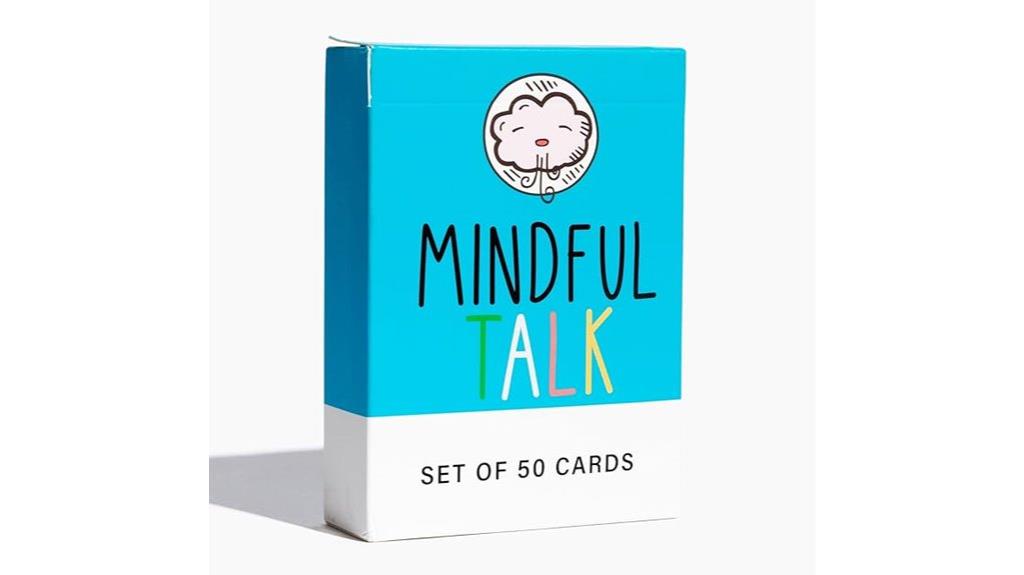
If you’re seeking an engaging way to help children develop emotional awareness and open communication, The School of Mindfulness offers a versatile mindfulness game designed specifically for kids aged 8 and above. This game features 50 question cards across four categories—Mindfulness, Emotion, Inquiry, and Expression—that encourage meaningful conversations. It’s perfect for family bonding, therapy, or classroom use, fostering self-reflection and emotional insight. With easy-to-learn gameplay and flexible setup for 2-6 players, it promotes honest dialogue and helps kids articulate feelings they might struggle to express. Plus, it’s portable, making it a convenient tool for various settings.
Best For: parents, teachers, and therapists seeking an engaging tool to foster emotional awareness and open communication with children aged 8 and above.
Pros:
- Encourages meaningful conversations and self-reflection in kids.
- Easy to learn and versatile for various settings like family, therapy, or classroom.
- Portable and suitable for group or one-on-one play sessions.
Cons:
- Limited to children aged 8 and above, not ideal for younger kids.
- Playtime may vary, potentially exceeding the estimated 45-60 minutes for some groups.
- Some users may find the question cards less engaging if children are less interested in discussion-based activities.
Factors to Consider When Choosing Kids Mindfulness Cards
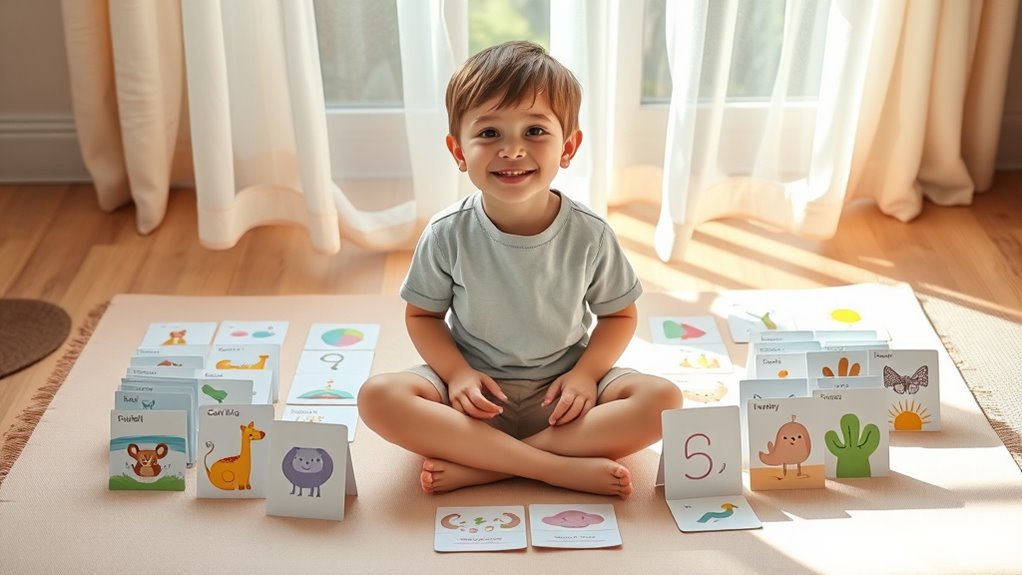
When selecting kids mindfulness cards, I always keep several factors in mind to ensure they’re a good fit. Things like age appropriateness, engagement level, and durability help me choose cards that are both fun and long-lasting. It’s also important to consider content variety and visual appeal to keep children interested and motivated.
Age Appropriateness
Choosing the right mindfulness cards for a child depends heavily on their developmental stage. I recommend checking the age recommendations on each set, such as 3+, 4-17, or 8+. This helps guarantee the language and concepts are appropriate for their reading ability and understanding. For younger kids, select cards with simple language and visuals that match their interests, avoiding overly complex prompts. For older children, look for cards that encourage deeper reflection and more advanced skills. It’s also important that the activities align with their emotional maturity, so the prompts aren’t too simplistic or too challenging. By considering age appropriateness, you can choose cards that genuinely resonate with your child’s developmental needs, making mindfulness both effective and enjoyable.
Engagement Level
The engagement level of kids’ mindfulness cards hinges on several key factors that keep children interested and active in their practice. Visual appeal plays a big role—bright colors and fun illustrations draw kids in and hold their attention. Interactive features, like prompts for movement, breathing, or storytelling, encourage active participation, making mindfulness enjoyable. The complexity and age-appropriateness of activities ensure children stay involved without feeling overwhelmed. Well-made, sturdy cards also boost engagement, as kids are more likely to handle and revisit them repeatedly. Additionally, incorporating variety—different categories or game-like elements—prevents boredom and keeps mindfulness sessions fresh. All these factors work together to make kids more enthusiastic to participate, fostering a positive and sustained mindfulness experience.
Durability & Quality
Durability and quality are essential considerations because kids’ mindfulness cards often withstand frequent handling and active use. I look for cards made from sturdy cardstock or laminated materials, guaranteeing they won’t easily tear or bend. High-quality cards have smooth edges and thick construction, which helps prevent fraying over time. It’s also important that the inks and finishes are non-toxic and water-based, making the cards safe for kids who might chew or spill on them. Reinforced corners or rounded edges add extra protection against wear and tear. The craftsmanship matters too—precise printing and secure lamination help the cards keep their appearance and functionality after multiple uses. Choosing durable, well-made cards ensures they’ll last long and continue supporting kids’ mindfulness practice with ease.
Content Variety
A diverse selection of mindfulness cards is essential because it guarantees kids stay engaged and find activities that resonate with their emotional and developmental needs. Including scripts, activities, affirmations, and prompts addresses different feelings and skills, keeping routines fresh and interesting. Variation in content, such as breathing exercises, visualization, movement prompts, and conversation starters, caters to different learning styles and preferences. A well-rounded set offers options for calming, focusing, social skills, and emotional regulation, providing extensive support as children grow. Additionally, having a range of themes and difficulty levels ensures the cards remain adaptable, evolving with kids’ developing mindfulness skills. This variety not only maintains interest but also encourages consistent practice, making mindfulness a natural, enjoyable part of their daily lives.
Visual Appeal
Choosing kids’ mindfulness cards becomes more effective when visual appeal is prioritized because engaging visuals can instantly capture children’s attention and make practicing mindfulness more enjoyable. Bright, colorful illustrations draw kids in and make the experience fun rather than a chore. Friendly characters and soothing imagery help create a calming atmosphere that encourages participation. Clear, simple visuals also enhance understanding of instructions and concepts, making it easier for children to follow and remember techniques. Attractive designs motivate kids to use the cards regularly, helping establish consistent routines. Well-thought-out visuals foster emotional connections and positive associations with mindfulness, boosting overall effectiveness. When choosing cards, prioritize appealing, friendly, and calming imagery to keep children engaged and interested in their mindfulness journey.
Ease of Use
When selecting kids’ mindfulness cards, it’s crucial to prioritize ease of use to guarantee children can engage confidently and independently. Look for cards with clear, simple instructions that kids can easily understand and follow without adult help. Large, visually engaging cards are especially helpful for younger children or those with fine motor challenges, making handling comfortable and effortless. Choose sets with straightforward prompts or activities that require minimal prior knowledge, fostering independence. Durability is also key—high-quality materials prevent wear and tear, reducing frustration during use. Additionally, organized categories or color coding help children quickly find suitable activities, streamlining their experience. By focusing on these factors, you ensure mindfulness practice remains accessible, enjoyable, and stress-free for kids.
Therapeutic Alignment
Since therapeutic alignment is vital for effective mindfulness practice, I always recommend checking if the cards support specific mental health frameworks like CBT, DBT, or social-emotional learning. This guarantees the tools can help address particular emotional challenges such as anxiety, anger, or self-esteem issues. It’s also important to verify that the content suits the child’s developmental stage and is appropriate for clinical use by mental health professionals. I look for cards that include evidence-based practices or guidance, making it easier to integrate them into therapy sessions or treatment plans. Clear instructions and visual cues are indispensable for consistent, purposeful use aligned with therapeutic goals. When these elements are in place, the cards become powerful supports in fostering emotional resilience and mindfulness mastery.
Frequently Asked Questions
How Do I Select Age-Appropriate Mindfulness Cards for My Child?
To pick age-appropriate mindfulness cards for my child, I look at the recommended age range on the packaging. I consider their developmental level and interests—if they’re young or need simple activities, I choose cards with bright images and easy exercises. For older kids, I pick cards with more complex prompts. I also read reviews to see if other parents found them engaging and suitable for my child’s age and needs.
Can Mindfulness Cards Help Children With Special Needs?
Yes, mindfulness cards can definitely help children with special needs. I’ve seen how they offer simple, visual tools that promote calmness and focus. These cards can be tailored to individual sensitivities, making them accessible and engaging. I recommend selecting cards with clear images and gentle prompts, which can support emotional regulation and build coping skills in a way that feels safe and encouraging for kids with unique challenges.
Are These Cards Suitable for Group or Individual Use?
Like a trusty knight’s shield, these mindfulness cards work well for both group and individual use. I’ve seen kids thrive in a circle, sharing feelings and practicing focus together, but they’re equally effective when used solo, helping children calm their minds and build concentration. Whether in a classroom or at home, these cards adapt easily, making mindfulness accessible and fun for every child, no matter the setting.
How Often Should Children Practice With Mindfulness Cards?
I recommend children practice with mindfulness cards daily or at least a few times a week. Consistency helps them build a calming routine and improves focus over time. I find that short, 5-10 minute sessions work best, especially if they’re new to mindfulness. You can also adapt based on your child’s needs—some may benefit from more frequent practice, while others prefer less. The key is making it a regular, enjoyable habit.
What Safety Considerations Exist for Using Mindfulness Cards With Kids?
When using mindfulness cards with kids, safety is key. I recommend ensuring the cards are non-toxic, made of safe materials, and free from small parts that could be a choking hazard. Always supervise young children during activities, and choose age-appropriate content that aligns with their developmental level. If a child shows signs of discomfort or distress, I stop the activity immediately and check in with them.
Conclusion
Did you know that practicing mindfulness can reduce stress in kids by up to 30%? With so many engaging cards out there, finding the right one can truly make a difference in your child’s focus and calmness. Whether it’s through games, affirmations, or activities, these tools turn mindfulness into a fun, everyday habit. I hope this list helps you discover the perfect cards to support your child’s well-being and create moments of calm amidst busy days.
